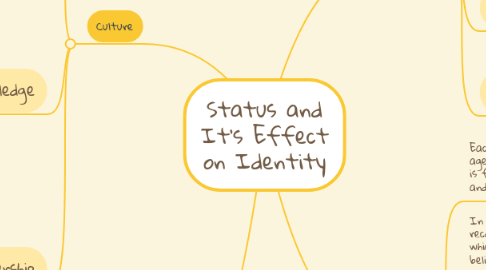
1. Gender
1.1. Gender difference is taken as one of the bases of ascribing status to individuals due to which they form task according to their status.
1.1.1. Contradiction: In Tchambuli People, women are income earners and males perform household work. They dressing is also in accordance to it.
1.1.2. Among the Mundugumor People, both genders are equally aggressive.
1.1.3. In some tribes father trains his son about various creative skills.
1.2. Female
1.2.1. It is mainly due to her "child bearing function". There is social discrimination between genders, due to which they get less exposure, recognition, proper social status and etc. Women are handicapped in competition against men in most of the fields.
1.3. Physiological aspect
2. Culture
2.1. Morale & Family Values
2.1.1. Beliefs
2.1.1.1. Restrict is generally imposed as a precautionary measure.
2.1.1.2. Society and individuals are resistant to change.
2.1.2. Kinship Status with parents and family.
2.1.2.1. New born are identified with that of parents
2.1.3. Is ascribed status of children and achieved status of parent is a cause of family disputes.
2.2. Religion & Knowledge
2.2.1. Personal
2.2.1.1. Knowledge
2.2.1.1.1. Knowledge various thing such as circumstance or fact gained through firsthand observation or experience.
2.2.1.2. Religion
2.2.1.2.1. Understanding and development ones personal religion and what an individual defines religion to be.
2.2.2. Shared
2.2.2.1. Knowledge
2.2.2.1.1. Knowledge various thing such as circumstance or fact gained through learned through other, collective knowledge.
2.2.2.2. Religion
2.2.2.2.1. Practicing, understanding and believing in a particular religion that is followed by the community you live in.
2.3. Impact on Leadership
2.3.1. People often follow and develop a personal connection and sentiments with people from same culture and background.
2.3.2. Social Conflicts and domination over people
3. Age
3.1. Each living individual is subject to different age statuses during his lifespan. The status is further classified and roles, expectation and recognize in accordance to it.
3.2. In some societies unborn and dead are recognized as two peculiar age periods which their own importance. Unborn are believed to be the spirits of departed ancestors.
3.3. Some communities observes puberty rites. Transition from childhood to adulthood involves a great strain.
3.4. In India, China, Japan and etc. old people receive high degree of reverence, and respect while in west they may not be treated the same. In Japan it was customary for old father to hand over power to this son in a formal manner.
3.5. Is status is in accordance to age? Can ascribed of some be achieved status with age?
4. Other Bases of Ascription
4.1. Racial Traits
4.2. Caste Status
4.3. Family
4.3.1. Fact of Adoption
4.3.2. Fact of the Death of Parent
4.3.3. Occurrence of Divorce

